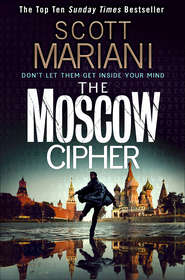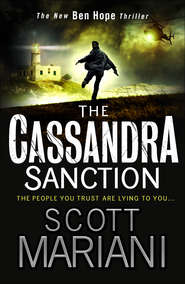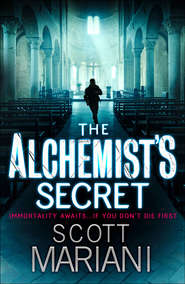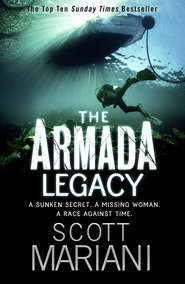По всем вопросам обращайтесь на: info@litportal.ru
(©) 2003-2024.
✖
Conspiracy Thriller 4 E-Book Bundle
Автор
Год написания книги
2019
Настройки чтения
Размер шрифта
Высота строк
Поля
‘How did they die?’ the Israeli asked sadly.
‘In an accident that wasn’t, caused by someone who wants the sword.’
Hillel absorbed this gravely, then peered at Ben with renewed suspicion. ‘And why should I believe you were Simeon’s friend? He never mentioned anybody called Ben Hope.’
The storeroom door burst open again. Half expecting it to be more members of staff come to rescue their boss, Ben turned. It was Jude.
‘Were you going to leave me sitting there all day?’ Jude said indignantly.
Hillel’s face darkened at this further intrusion into his privacy – then he did a double-take and peered at Jude with narrowed eyes. ‘I know you,’ he said, pointing. ‘You are Simeon’s boy. He showed me a photograph of you.’ He glanced from Jude to Ben, the suspicion melting away.
‘My father’s dead,’ Jude said. ‘If you know anything that could help us understand why, we’d be very grateful to you, sir.’
‘I truly grieve for your loss,’ Hillel said, clutching Jude’s arm with a big hand. ‘Your father was my friend.’ He turned to Ben. ‘Please forgive my rudeness. Tell me about Fabrice Lalique and Wesley Holland. What has happened to them all?’
It was the first time Ben had known the American’s surname. ‘Lalique was thrown off a bridge near his home in France. It was made to look like suicide. As for Holland, as far as I know he’s somewhere in America, running for his life.’
‘But how is it possible that a sword could bring such trouble?’ Hillel asked.
‘Mr Zada, the clock is ticking. The more I know about this thing, where it came from, what it is and who wants it so badly, the easier it’ll be for me to find these people before it’s too late. Right now I’m in the dark. You need to tell me everything.’
‘Are you a detective?’
‘I’m just someone who wants to help,’ Ben said. ‘And I need yours.’
Hillel nodded solemnly. ‘It will take a long time and I have a family engagement this evening.’ He reached inside his coat, slipped out a business card and handed it to Ben. ‘Meet me tomorrow morning at eight, at my home. And I promise you, you will hear the whole story.’
Chapter Forty-Four
‘I want words with you, Ezekiel.’
When his father said ‘I want words with you,’ there was always bound to be trouble. And trouble meant pain. The boy readied himself. He could handle pain. He’d handled it before. Nothing his father could do to him physically hurt him as much as the sound of his own name. Ezekiel Penrose Lucas. A cruel affliction that had tormented him every day of his young life.
Ezekiel Squeakiel, his classmates called him, in mockery of his still-unbroken voice that had the habit of shooting up an octave when he was nervous, which was much of the time. ‘Ezekiel Squeakiel!’
‘You were fidgeting in church again today,’ his father pronounced in the solemn tone of a judge about to deal out a death sentence.
‘I was not fidgeting,’ the boy replied hotly.
‘You may think you can lie to me, but God sees everything. And so did Mrs Woods. She was horrified.’
‘Mrs Woods is a dirty old cockroach!’ Penrose screamed at his father. ‘I hate her and I wish she was dead!’
‘Hell rip and roast you for a bastard, boy!’ his father shouted back, turning dark red. With a terrible slowness, he reached behind him and opened the hated cupboard door, and the speech began. ‘Those who are tainted shall drink the wine of the wrath of God …’ he intoned as he took the belt from the jar of vinegar. He cracked it once, and a spatter of the foul-smelling liquid hit the wall. He beckoned to the boy. It was time for the punishment.
‘… and they shall be tormented by fire and brimstone in the presence of the holy angels …’
Whack. Whack. The belt falling and rising. The sharp lash of leather against bare buttocks.
Penrose’s face streamed with tears. He would not scream.
‘… and in the presence of the Lamb.’
He bit so hard on his lip to hold it in that he could taste blood in his mouth, but the pain was so strong that he couldn’t stop himself and a wail burst from his throat. ‘Mummy! Make him stop!’
But Mummy would not make him stop. Mummy was in the next room, too terrified to say a word to the tyrant, lest he turn the belt on her, too.
Then it was over, and Penrose could do nothing but whimper in pain and rage and wish his father the most terrible suffering a young boy could dream of.
‘Now get down on your knees and pray to God, that He may show you forgiveness.’
‘I hate God,’ the boy thought. ‘I wish God were dead, too.’
The next day, Penrose sneaked out of the house with something long under his arm, wrapped inside a plastic bag. Still aching from the beating, he made his way furtively up the street towards Mrs Woods’ house, half a mile away. The old cockroach lived alone with her beloved cat. The cat was fifteen or sixteen, had only one eye and was named Thomas O’Malley.
Penrose crouched hidden among the evergreens at the edge of her rambling garden. He slipped the plastic bag away to reveal his air rifle. With murder in his heart he quietly cocked the gun and slipped a .22 pellet in the breech. And waited, silently.
After a long time, there was a movement in the long grass. It was Thomas O’Malley. Penrose watched and his heart began to beat harder as the old cat moved slowly and stiffly through the garden.
Very carefully, the boy levelled the rifle. He found the cat in his sights and pulled the trigger. There was a crack as the spring mechanism fired the pellet from the barrel. The cat leaped in the air with a yowl and began thrashing on the grass. He’d got it in the stomach. Penrose jumped up from his hiding place and ran over to the suffering animal, clutching his rifle. ‘Hell rip and roast you!’ He raised the rifle up and brought the butt end of its stock down hard on the cat’s head. There was a crunch, and a lot of blood. He raised the rifle and did the same again.
‘Hell rip and roast you!’
The cat stopped moving, broken and squashed on the bloody grass. Penrose stood staring at it. He felt no remorse for having killed it. A smile spread over his face.
A voice made the boy turn. It was Mrs Woods up by the house, calling the cat’s name. Penrose was frightened she might come looking for it. He slipped away into the bushes.
Penrose faintly registered the knock at his office door and raised his head slowly off his desk. He unglued one gummed-up eye, then the other, and blinked at the light streaming in through the office window. In front of him on the desk’s littered top were his beloved pistol and his bottle of painkillers. He felt woozy from the pills. The surface of the desk seemed to tilt before his eyes.
Rex O’Neill knocked on the door once more, and then walked into the room without waiting for a prompt. ‘How’s the headache?’
‘What do you want?’ Penrose demanded, livid at the interruption.
‘To give you the latest update on Hope.’
Penrose’s face lit up. At last. When the call from Cutter’s man Gant had come in from France some eighteen hours earlier, saying that they’d captured Hope and Arundel, it had been cause for wild celebration and the opening of several cases of vintage Dom Pérignon, many bottles of which had been consumed by the team. Even Penrose had deigned to take a sip or two in the spirit of the moment. O’Neill had, of course, abstained, disapproving as always.
But as the hours had begun stacking up since the call without any further feedback from the team in France, Penrose had been growing increasingly anxious to know what was happening. He’d been convinced for a while now that Hope knew where the sword was. He’d probably had it himself, all along. Why else would Simeon Arundel have brought a man like him on board, if not to entrust the precious cargo to him? Why else would Hope be travelling with Arundel’s son?
Penrose quivered with anticipation. ‘Well? Did we get them? Do we have the sword?’
‘I’m afraid not. It isn’t good news.’
Penrose turned suddenly white.
‘There’s been no further contact from Gant,’ O’Neill went on. ‘And I’ve just received word that Hope and Arundel’s son cleared passport control at Ben Gurion Airport in Jerusalem this afternoon.’
Penrose’s face went from white to puce. ‘But how could that be?’ he exploded. ‘We had them.’











